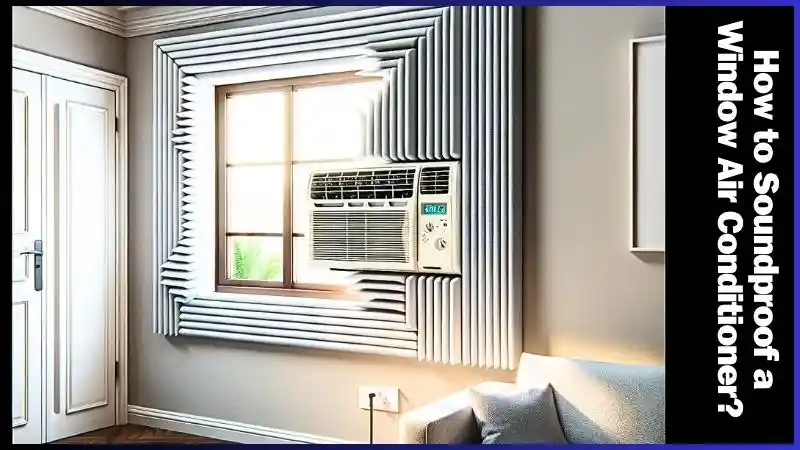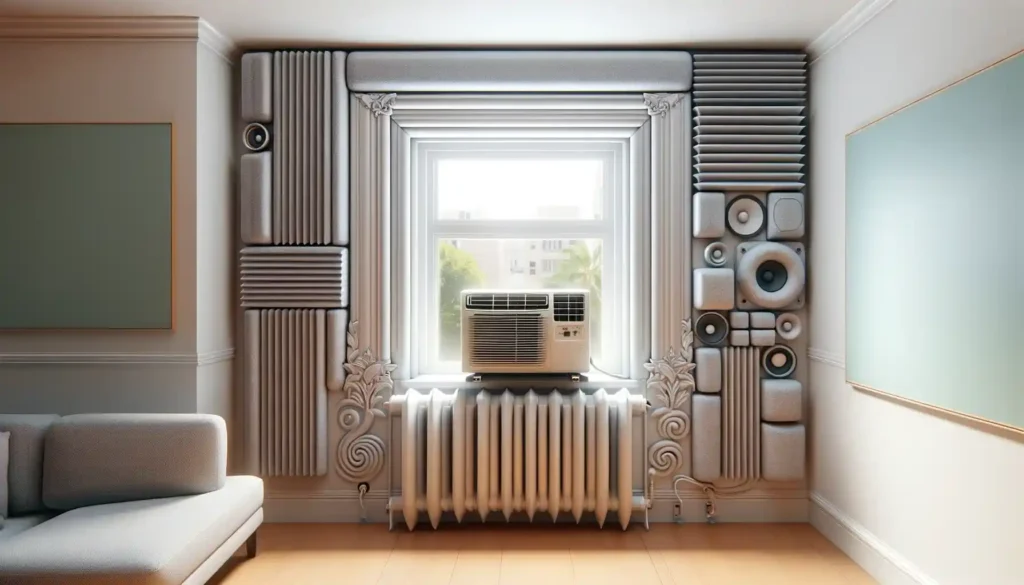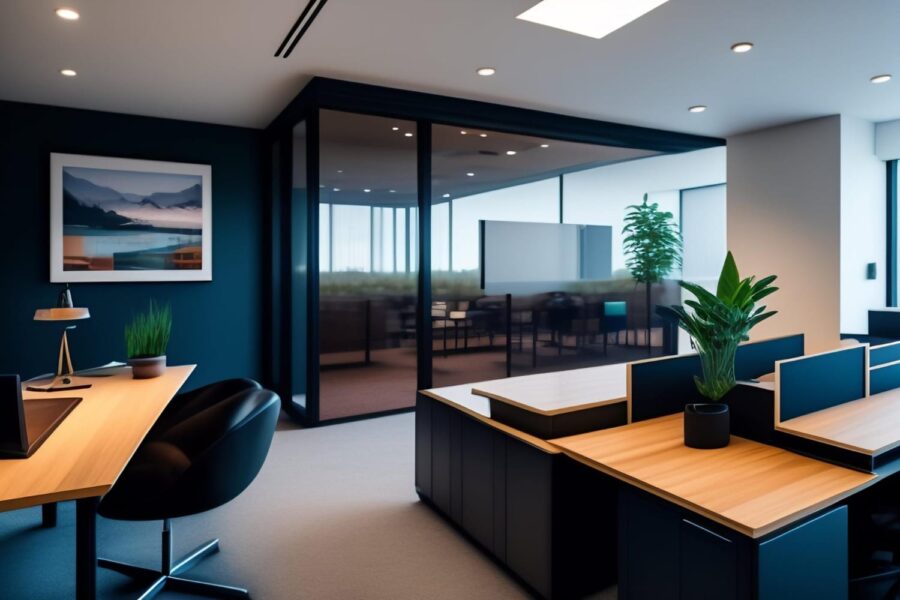To soundproof a window air conditioner, place insulation on either side and use weather stripping to fill gaps between the upper window insert and the unit. You can also use L brackets to keep the upper insert in place or install a mullion for the best noise reduction.
When it comes to living in a noisy environment, keeping an air conditioner soundproof becomes essential for a peaceful atmosphere.
However, window air conditioners can let in a lot of outdoor noise. Utilizing insulation and weather stripping can effectively reduce noise infiltration and create a quieter living space.
This article will explore various methods to soundproof a window air conditioner, providing tips for noise reduction and creating a more serene indoor environment.
Whether it’s for a peaceful night’s sleep or improved concentration, soundproofing a window air conditioner can significantly enhance the quality of indoor living.
Ultimate Guide To Soundproofing Your Ac Unit

Are you tired of the constant noise from your air conditioner disrupting your peace and comfort? Soundproofing your AC unit can significantly reduce the unwanted noise and create a more serene indoor environment.
In this comprehensive guide, we’ll delve into the various techniques and materials you can use to effectively soundproof your window air conditioner. Say goodbye to the irritating hum and embrace a quieter, more tranquil living space.
Understanding How Sound Travels And Impacts Comfort
Before diving into the solutions, it’s crucial to understand how sound travels and affects your comfort. Sound waves can easily pass through open windows and gaps, causing disturbance within your home.
By comprehending the principles of sound transmission, you can effectively address the sources of noise and implement targeted soundproofing measures.
Assessing The Noise Level Of The Current Window Ac Setup
Prior to soundproofing your AC unit, it’s essential to assess the current noise level and identify the areas contributing to the disturbance.
By conducting a thorough evaluation, you can pinpoint the specific points where soundproofing measures are needed, ensuring a more focused and effective approach.
This assessment sets the foundation for implementing tailored soundproofing solutions that address the unique noise issues of your window air conditioner setup.
Identifying Weak Points Around Ac

Soundproofing a window air conditioner can significantly reduce indoor noise levels, creating a more peaceful and comfortable living space. To effectively soundproof the unit, it’s crucial to begin by identifying weak points that may be allowing noise to penetrate indoors.
Checking For Gaps And Areas That Let In Noise
Start by inspecting the area around the window air conditioner for any gaps, cracks, or spaces that could be allowing noise to enter the room.
Common weak points include the area between the air conditioner and the window insert, as well as any gaps around the unit itself.
Importance Of A Full Assessment Before Soundproofing
Prior to implementing any soundproofing solutions, it’s essential to conduct a thorough assessment of the entire window air conditioner setup.
This evaluation ensures that all potential weak points and areas allowing noise infiltration are identified, enabling a tailored and comprehensive soundproofing approach.
Selecting Materials For Soundproofing
When it comes to soundproofing a window air conditioner, selecting the right materials for soundproofing is crucial. The materials chosen should effectively reduce the noise from the outside while ensuring that the air conditioner operates efficiently.
Below, we will discuss an overview of sound-absorbing versus sound-blocking materials, along with the recommended materials for insulating window air conditioners.
Overview Of Sound-absorbing Vs. Sound-blocking Materials
Sound-absorbing materials are designed to absorb and reduce sound waves, thereby minimizing the transfer of noise. Common examples of sound-absorbing materials include foam panels, acoustic baffles, and fiberglass insulation. These materials are effective in dampening sound and preventing echoes.
On the other hand, sound-blocking materials are intended to create a barrier that prevents sound from passing through. This involves using dense and heavy materials such as mass-loaded vinyl, soundproofing curtains, and thick isolation pads.
Sound-blocking materials work by impeding the transmission of sound waves, thereby reducing noise infiltration.
Recommended Materials For Insulating Window Air Conditioners
| Materials | Properties |
|---|---|
| Mass-Loaded Vinyl (MLV) | Highly effective in blocking airborne noise and vibrations due to its dense composition. MLV can be installed as a barrier to minimize sound transmission. |
| Acoustic Foam Panels | These lightweight and porous panels are capable of absorbing and dampening sound, making them suitable for reducing echoes and reverberations. |
| Soundproofing Curtains | Thick, heavy curtains designed to block external noise and reduce sound reflections within the room, providing effective sound insulation for the window area. |
| Fiberglass Insulation | A versatile, cost-effective solution for soundproofing, fiberglass insulation can be used to fill gaps and create a barrier against noise infiltration. |
Installing Insulation And Barriers
Noise from a window air conditioner can be disruptive, but you can minimize it by installing insulation and barriers effectively. By taking the right steps, you can reduce the sound without obstructing the airflow.
Step-by-step Guide On Applying Insulation Effectively
When soundproofing a window air conditioner, applying insulation correctly is crucial. Follow this step-by-step guide to ensure that you are effectively reducing the noise:
- Measure and cut: Measure the dimensions of the window unit and cut the insulation material to the appropriate size.
- Place the insulation: Position the insulation on either side of the air conditioner, ensuring a snug fit to minimize air gaps where noise can escape.
- Use weather stripping: Fill any gaps between the upper window insert and the AC unit with weather stripping to further prevent sound leakage.
- Consider L brackets: If you prefer not to install a mullion, use L brackets to secure the upper window insert in place for effective noise reduction.
Tips On Soundproofing Without Obstructing Airflow
It’s essential to soundproof your window air conditioner without impeding its airflow. Here are some tips to achieve effective soundproofing while maintaining optimal airflow:
- Choose suitable materials: Utilize soundproofing materials that provide effective noise reduction without blocking the airflow to ensure the AC unit’s efficiency.
- Strategically position barriers: Place barriers and insulation in a way that doesn’t obstruct the airflow, allowing the air conditioner to function effectively while reducing noise.
- Adjust for optimal performance: Regularly check and adjust the insulation and barriers to ensure they do not interfere with the ventilation and cooling capabilities of the window air conditioner.
Sealing And Weatherproofing Strategies
When it comes to soundproofing a window air conditioner, implementing effective sealing and weatherproofing strategies is essential. This process involves correctly applying weather stripping and caulk, as well as maintaining a proper seal to minimize noise infiltration and improve overall insulation.
How To Correctly Apply Weather Stripping And Caulk
Properly applying weather stripping and caulk is crucial in sealing gaps and preventing outdoor noise from entering your living space. Follow these steps to effectively apply weather stripping and caulk:
- Clean the surfaces: Ensure that both the window frame and the air conditioner unit are clean and free from any dust or debris.
- Measure and cut: Carefully measure the dimensions of the gaps and cut the weather stripping to fit accordingly.
- Apply weather stripping: Affix the weather stripping to the edges of the window frame and any spaces where air may leak in.
- Use caulk: Apply caulk to seal any remaining gaps and cracks around the air conditioner unit and the window frame.
Importance Of Maintaining A Proper Seal
Maintaining a proper seal is vital for soundproofing a window air conditioner and preventing unwanted noise from entering your home. Failure to uphold a tight seal can lead to increased noise infiltration and reduced insulation efficiency.
Regularly inspect the weather stripping and caulk to ensure that they remain intact and effective in minimizing air and sound leakage.
Maintaining Your Soundproofed Ac
To soundproof a window air conditioner, consider placing insulation on each side and using weather stripping to fill the gap between the upper window insert and the unit.
Additionally, utilizing L brackets or installing a mullion can also help reduce noise. Cleaning the unit to remove any accumulated dirt and debris may further help to minimize noise.
Once you have effectively soundproofed your window air conditioner, proper maintenance is essential to ensure its continued efficiency. This includes regular cleaning and upkeep of soundproofing materials as well as knowing when to replace soundproofing components for best results.
Cleaning And Upkeep Of Soundproofing Materials
Proper cleaning and upkeep of soundproofing materials are crucial to maintaining the efficiency of your soundproofed window air conditioner. Follow these simple steps to ensure the longevity of your soundproofing:
- Regularly cleaning the surfaces of soundproofing materials such as weather stripping, insulation, and any seals to remove dust, dirt, and debris.
- Prevent mold and mildew by ensuring that the materials are dry and moisture-free. Use a damp cloth to remove any buildup and allow the materials to air dry completely.
- Inspect for wear and tear regularly to identify any signs of damage or deterioration. Replace or repair any worn or damaged components promptly to maintain the effectiveness of the soundproofing.
When To Replace Soundproofing Components For Best Results
Although soundproofing materials are designed to be durable, they may require replacement over time to ensure optimal performance. Consider the following indicators that suggest it may be time to replace soundproofing components:
- Loss of efficiency: If you notice an increase in noise levels from your air conditioner, it may indicate that the soundproofing materials have become less effective and require replacement.
- Physical damage: Any visible signs of physical damage, such as tears, cracks, or warping, can compromise the soundproofing abilities of the materials and necessitate replacement.
- Deterioration: Over time, soundproofing materials may deteriorate due to exposure to environmental factors. Inspect for signs of deterioration, such as disintegration or discoloration, and replace as needed.

Credit: www.solutionsgc.com
Frequently Asked Questions On How To Soundproof A Window Air Conditioner?
How Can I Make My Window Air Conditioner Quieter?
To make your window air conditioner quieter, use insulation and weather stripping to fill gaps and install L brackets to secure the upper window. Remove dust and debris from inside the unit to reduce noise. Consider building a soundproof enclosure or using a sound blanket for further noise reduction.
How Can I Make My Air Conditioner Soundproof?
To soundproof your air conditioner, use insulation and weather stripping around the unit and upper window. Consider installing a mullion or using L brackets for additional noise reduction. Another option is to create a soundproof enclosure or fence around the unit.
Regular maintenance of the unit can also help reduce noise.
How Do I Silence My Noisy Air Conditioner?
To silence a noisy air conditioner, add insulation on both sides and use weather stripping to fill any gaps between the unit and the window. Consider installing a mullion or using L brackets for extra noise reduction. Regularly clean the unit to remove debris causing the noise.
Why Is My Window Air Conditioner So Loud Inside?
Your window air conditioner may be loud due to dust, dirt, and debris inside the unit. Regular cleaning can help reduce the noise.
Conclusion
Soundproofing a window air conditioner can greatly reduce unwanted noise. By using insulation, weather stripping, and L brackets, you can effectively minimize outdoor noise intrusion.
While not a complete solution, these methods provide significant noise reduction, making your living space more comfortable and peaceful. Upgrade your windows and consider enclosing the unit for even better results.
